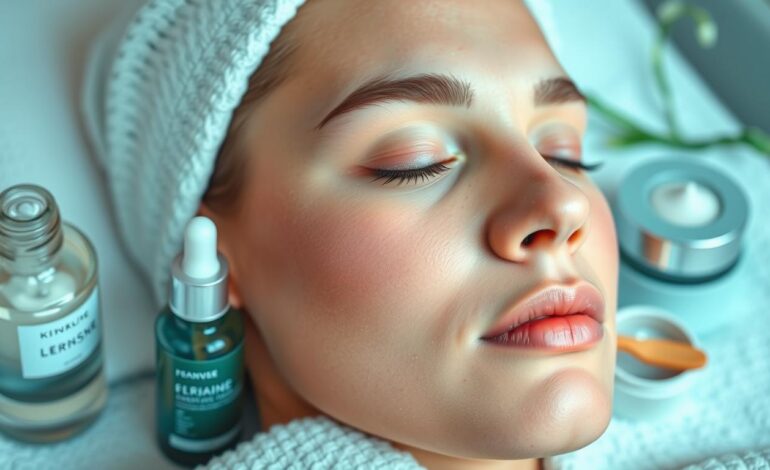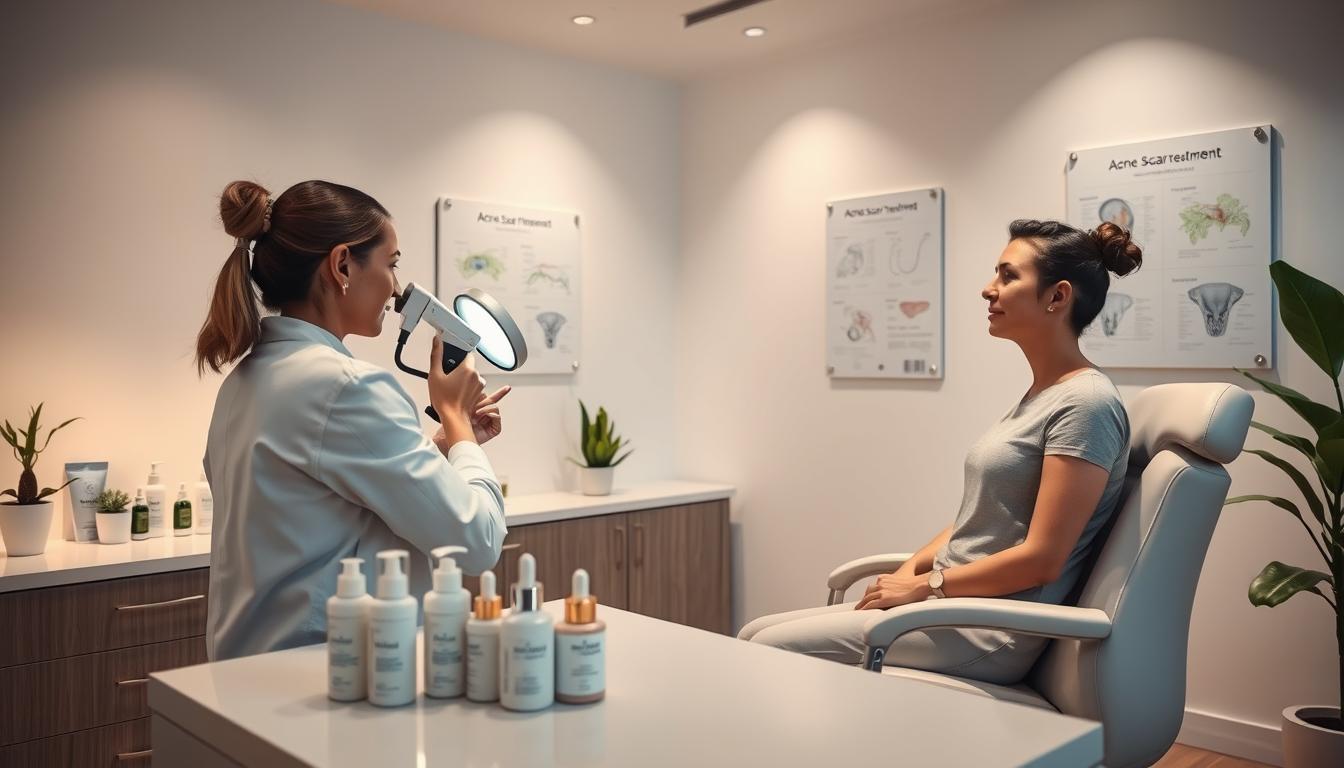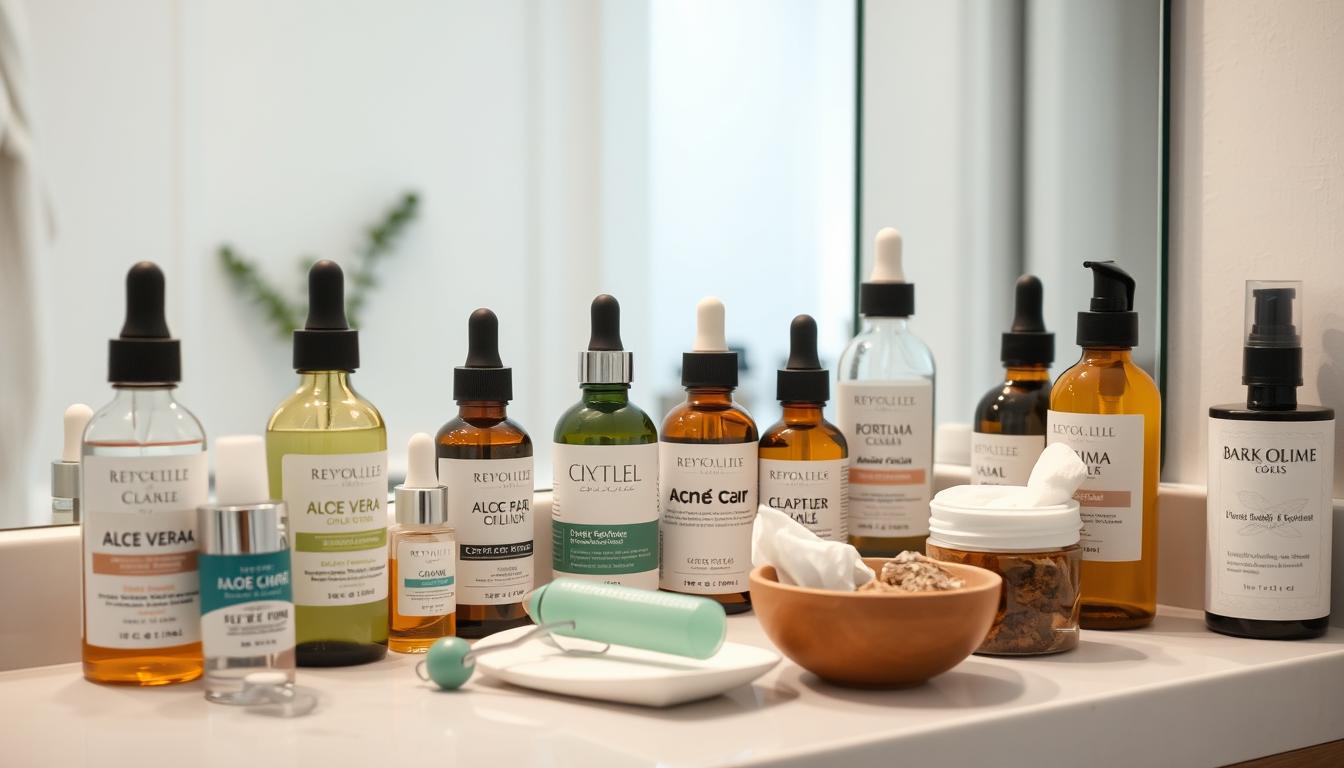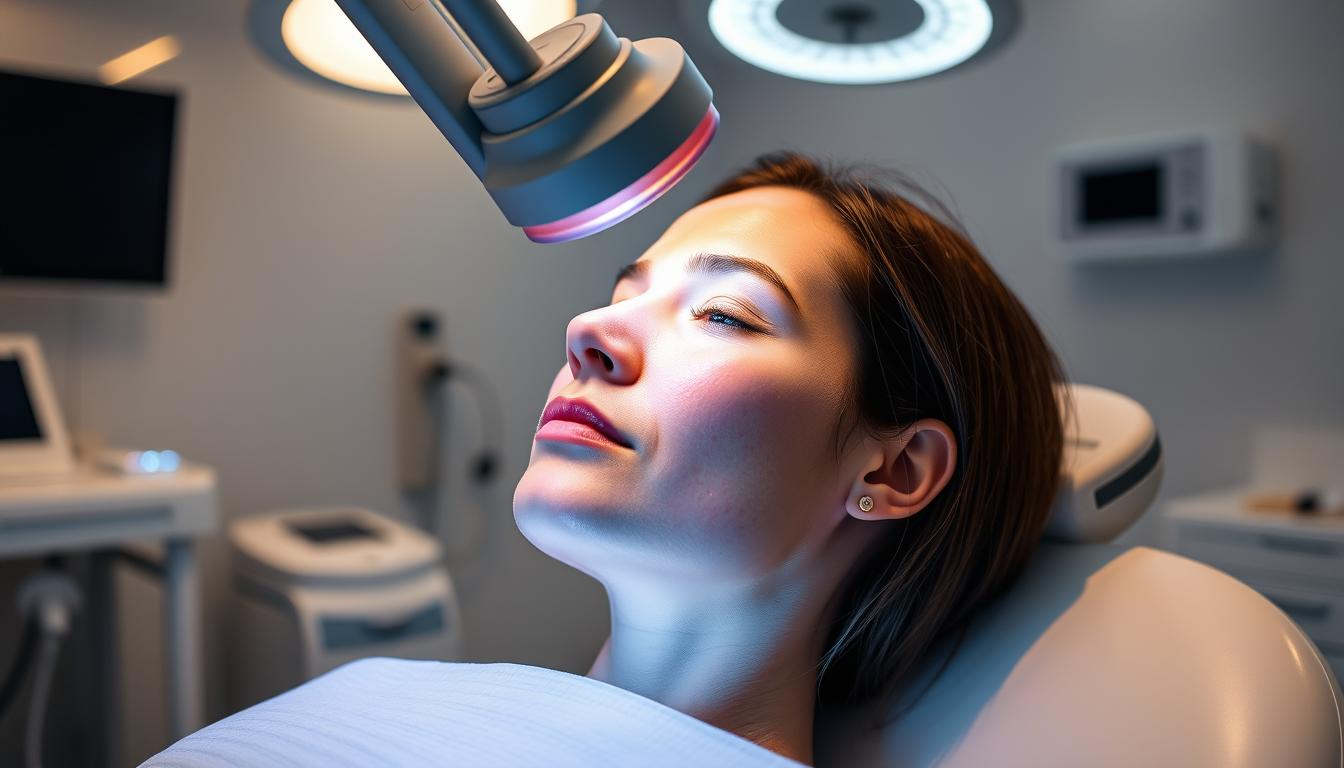How To Treat Acne Scars?

How To Treat Acne Scars can be a lasting problem, but there are many ways to make them less noticeable. The best method usually combines home care and professional treatments. These are chosen based on the scar type, skin condition, and how severe the scarring is.
Home remedies can help a lot. Using sunscreen, creams with azelaic acid or hydroxy acids, and exfoliating treatments at home can reduce the scar’s contrast. Professional treatments might include fillers, steroids, or Botox injections. They also include laser treatments, chemical peels, dermabrasion, skin needling, and minor surgeries.
The aim is to boost collagen, fill in scars, and even out the skin’s texture. This makes the skin look smoother and more even.
Key Takeaways
- Acne scars can be treated with a combination of home skincare and professional treatments
- Home remedies like sunscreen, medicated creams, and exfoliating treatments can help minimize the appearance of scars
- Professional treatments include injections, laser resurfacing, chemical peels, and skin needling to improve collagen production and texture
- The best approach is tailored to the individual’s scar type, skin type, and severity of scarring
- The goal is to achieve a more even complexion by reducing the contrast between scarred and unscarred skin
Understanding Acne Scars
Acne can leave scars that look different and have various causes. These types of acne scars include:
- Ice pick scars: Narrow, deep indentations in the skin, resembling the marks left by an ice pick.
- Boxcar scars: Square or round depressions in the skin with sharply defined edges.
- Rolling scars: Wave-like texture on the skin’s surface, giving it an uneven appearance.
- Hypertrophic scars: Raised, flat areas of scar tissue.
- Keloid scars: Raised, darker bumps that extend beyond the original wound site.
Causes of Acne Scarring
The causes of acne scarring include several factors. These include the severity of the acne, skin-picking, and genetics. Severe acne can cause deep damage and increase scarring risk.
Also Read : How To Choose A Skincare Regimen?
People with a genetic tendency to scar, especially those with darker skin, are more likely to get keloid and hypertrophic scars.
Also Read : How To Reduce Wrinkles Naturally?
| Type of Acne Scar | Appearance | Causes |
|---|---|---|
| Ice Pick Scars | Narrow, deep indentations | Severe acne lesions that penetrate deeply into the skin |
| Boxcar Scars | Square or round depressions with sharply defined edges | Moderate to severe acne lesions that cause damage to the skin’s collagen |
| Rolling Scars | Wave-like texture on the skin’s surface | Acne lesions that cause damage to the skin’s underlying support structures |
| Hypertrophic Scars | Raised, flat areas of scar tissue | Excessive collagen production during the healing process |
| Keloid Scars | Raised, darker bumps that extend beyond the original wound site | Genetic predisposition, especially in individuals with darker skin tones |
Knowing the types of acne scars and their causes of acne scarring is key. It helps in creating a treatment plan that meets each person’s needs.
Also Read : Sensitive Skin Care Tips: Nurture Your Delicate Skin
Consultation and Treatment Planning

Getting the best results for acne scars starts with a visit to a board-certified dermatologist. At the acne scar consultation, the dermatologist will check your skin. They will find out what kind of scars you have and what you hope to achieve.
Also Read : Effective Daily Skin Care Regimen For Oily Skin
When making a acne scar treatment plan, several things are considered. These include your age, skin type, budget, and how much time you can take off. The plan might include different treatments. First, they’ll tackle any active acne. Then, they’ll focus on the scars.
Also Read : Effective Acne Scar Treatment At Home Methods
“The key to successful acne scar treatment is a customized plan that addresses the unique needs of each patient.”
The dermatologist will talk with you to understand your worries and what you want. This way, the treatment plan will meet your needs and goals. This teamwork helps set clear expectations and boosts the chance of getting the results you want.
By teaming up with a skilled dermatologist and getting a detailed acne scar treatment plan, you’re on your way to better skin. You’ll feel more confident too.
How To Treat Acne Scars

Treatments for Depressed Scars
Dermatologists have many ways to treat depressed acne scars. Chemical peels can help by making more collagen. This fills in the skin’s depressions.
Soft tissue fillers, like collagen or fat, can also be used. They make sunken scars look better, but the effect lasts only a short time. Laser treatments and microneedling work by boosting collagen and elastin. They help reduce the look of depressed scars slowly.
For serious scarring, doctors might suggest surgery. Techniques like punch excisions or subcision can greatly improve the skin’s look.
It’s important to get a treatment plan from a skilled dermatologist. They can help you find the best acne scar treatments for your skin. With the right care, you can say goodbye to those scars.
Treatments for Raised Scars

Dermatologists use special techniques to treat raised acne scars. These scars, like hypertrophic and keloid scars, need a different method than depressed scars.
Laser therapy is a common treatment for raised scars. It breaks down the extra collagen that causes these scars. The laser energy makes the scar smoother and flatter, improving its look over time.
- Laser treatment for raised scars
- Steroid injections to soften and flatten raised scars
- Topical medications to reduce the appearance of hypertrophic and keloid scars
Steroid injections are also effective for raised acne scars. Dermatologists inject corticosteroids or other medications into the scar. This reduces inflammation and softens the scar, making it less noticeable.
Sometimes, a mix of treatments is needed for raised acne scarring. Your dermatologist will create a plan just for you. This plan will address your specific scarring concerns.
“Treating raised acne scars requires a tailored approach that may involve laser therapy, steroid injections, and other specialized techniques.”
Conclusion
Treating acne scars needs a mix of home care and professional treatments. This approach is tailored to each person’s scars and skin. With many options available, it’s possible to improve scars and feel more confident.
Working with a dermatologist helps create a treatment plan that fits your skin. You can use creams, procedures, or lasers to lessen scar visibility. This way, you can get clearer, more even skin.
Adding skin care for acne scars to your daily routine helps too. It works better when done with professional treatments. With time, effort, and the right treatments, you can manage your scars and feel better about yourself.
FAQs
Q: What is the best treatment for acne scars?
A: The best treatment for acne scars varies depending on the type and severity of the scars. Options include chemical peels, laser therapy, microneedling, and fillers. A consultation with a dermatologist can help determine the most effective treatment for your specific situation.
Q: How can I get rid of acne scars at home?
A: You can try over-the-counter treatments containing ingredients like salicylic acid, retinoids, or vitamin C to help improve the appearance of acne scars. However, for more significant results, professional treatments are often more effective.
Q: Can acne scars be prevented?
A: While you can’t prevent all acne scars, you can minimize your risk by treating acne promptly and effectively, using non-comedogenic skincare products, and avoiding picking or squeezing pimples. This helps to prevent acne and reduce the likelihood of scars.
Q: What are the differences between atrophic and hypertrophic scars?
A: Atrophic scars are indented scars that occur when the skin loses collagen during healing, while hypertrophic scars are raised and result from an overproduction of collagen. Both types can be treated with different methods, and understanding your scar type is essential for effective treatment.
Q: How does the treatment for acne scarring begin?
A: Treatment for acne scarring begins with a consultation with a dermatologist, who will assess the scars and recommend appropriate treatment options based on your skin’s condition and your goals.
Q: Are there any safe and effective treatments for acne scars?
A: Yes, there are several safe and effective treatments for acne scars, including laser treatments, chemical peels, and microneedling. These methods can help reduce the appearance of scars and improve skin texture.
Q: What should I do if my acne scars won’t go away?
A: If your acne scars won’t go away, consider consulting a dermatologist for a personalized treatment plan. They can offer specialized treatments that may help improve acne scars that home remedies cannot address.
Q: How long does it take to see results from acne scar treatment?
A: The time it takes to see results from acne scar treatment varies depending on the treatment method used. Some treatments provide immediate improvements, while others, like laser therapy or microneedling, may take several weeks to show significant changes.
Q: Can over-the-counter products really improve acne scars?
A: Over-the-counter products can help improve the appearance of acne scars, particularly those that contain active ingredients like salicylic acid or retinoids. However, for deeper or more severe scars, you may need professional treatments for more effective results.





